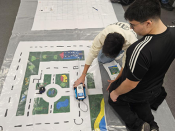The periodic table: Some mathematical aspects
José Francisco Rodrigues (CIM and FCiências/ULisboa)
The periodic table is central to chemistry and after one and half century of life it became one of the indispensable tools for science and an icon for scientific inquiry. Although until now mathematicians have little to say on the periodic table, the mathematical chemistry is an expanding interdisciplinary area. Recent works have shown the importance of the underlying mathematics of the periodic table in diverse areas such as group theory, topology, information theory and, of course, quantum mechanics. This introductory talk intends to make a short introduction to some mathematical aspects related to the periodic table, from a mathematician perspective.
The periodic table: The power of systematisation. The importance of precision
Manuel Yáñez and Otilia Mo (Universidad Autónoma de Madrid)
One hundred and fifty years ago the first important systematization in the realm of chemistry was done, ordering the elements in terms of its atomic mass. This first attempt was crucial even though not totally correct. A better knowledge of the atomic structure improved this initial systematization in terms of the number of electrons; but a real understanding of the periodicity in the atomic properties was possible only when the mathematical functions describing the electrons within an atom were obtained. The use of the variational principle looking for the minimal energy of an atomic and molecular system was the engine behind this understanding, though soon it became also clear that, in some specific cases, second order properties could be not adequately described even if the precision got for the energy was large. Magnetic properties are a good example, or the singularity of the elements of the first row of the periodic table with respect to the others within the same group. Some of these questions will be analyzed in our presentation.
The periodic table: Are atoms the bricks of molecules?
Adelino Galvão (ISTécnico/ULisboa)
Chemists are the architects of the electronic cloud to give it shape and function. Atomic nuclei are bare necessities (like rebars in concrete) to provide the external potential that hold and shape electrons within the molecule, but otherwise useless in what concerns its chemical properties. Those are defined, in the Quantum formalism, by a statistical distribution function that we believe can be expressed by a linear expansion in a basis of pre-existent atomic centered distribution functions. Time as proved that this approach must be completed with extra polarization and diffuse functions to get results within experimental accuracy. The shape of the wave function resulting from the overlap of so many different basis functions has no resemblance to the original atoms that made the molecule. For instance, in the C-O molecule how can one divide between C and O the charge density in the middle of the bond? Traditional chemical concepts like bonds, rings, nonbonding pairs, electrophilic, nucleophilic,. electronegativity, functional group, etc. are lost in the wave function formalism. Those can be recovered by proving that the wave function uniquely defines the charge density (and vice-versa) and both are uniquely defined by the external potential. We will show, by topological analysis of the charge density, how to recover the traditional chemical language, such as atoms, in a quantum formalism and precisely define what is an atom in a molecule.
The periodic table: Counting lattice points and atomic energies oscillations
Antonio Córdoba (ICMAT and UAMadrid)
The purpose of this talk is to present an oscillatory term appearing in the nonrelativistic theory of large atoms. To account for chemical phenomena, one wants a very accurate determination of their ground state energies and its analogue for molecules. Unfortunately, such great accuracy is more than we can achieve today. Nevertheless, there are some results involving an almost periodic trigonometric sum related with the understanding of the periodic table from first principles of Quantum Mechanics. It is a sum reminiscent of those appearing in Number Theory when we try to count Lattice Points inside circles or spheres.






















